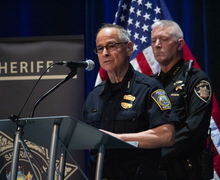ASP forum addresses accessibility, greater community outreach after 1st draft release
Dominic Chiappone | Asst. News Editor
Syracuse University Provost, Vice Chancellor and Chief Academic Officer Gretchen Ritter gives her opening remarks at a Thursday morning forum on the university's Academic Strategic Plan. Over 100 people attended the event as Ritter moderated the forum to collect insight on how SU’s planning should move forward.
Get the latest Syracuse news delivered right to your inbox.
Subscribe to our newsletter here.
At the first forum on Thursday afternoon following the release of the first draft for Syracuse University’s Academic Strategic Plan, university officials laid out the plan’s diversity, equity, inclusion and accessibility objectives for study abroad, outreach in the city of Syracuse and interaction with local Indigenous culture.
Gretchen Ritter, SU’s provost, vice chancellor and chief academic officer, moderated the forum to collect insight on how SU’s planning should move forward. The initial draft, released Friday, outlined the university’s plans to open up study abroad opportunities so that all undergraduate students can participate in a program by 2028.
Jamie Winders, SU’s associate provost for faculty affairs, said SU’s individual schools and colleges will need to revise curriculum to meet the needs of students with “rigid” degree tracks in order to meet the ASP goal of allowing all undergraduate students to study abroad. The plan aims to ensure students — including those with rigorous degree requirements, financial constraints, athletic commitments and intellectual or developmental disabilities —have the opportunity to participate in a study abroad program, Ritter and some panel members said.
SU is in conversations with the study abroad office to also provide expanded study abroad opportunities for students with intellectual or learning disabilities, said Christy Ashby, SU’s director for the Center on Disability and Inclusion and the co-chair of ASP’s public impact working group.
“When we think about a commitment to (study) abroad, in a way, we have to think about that commitment to our entire campus community,” Ashby said.
At the meeting, which had close to a hundred participants in-person and via Zoom, Ritter said she had never seen such high levels of engagement in an academic strategic planning process. She said at least 2,000 people from the university community contributed to the ASP process since its launch in September 2022.
“This isn’t my plan. This isn’t the plan of any of the individuals on the stage. This is our plan, and believing in that provides the conditions for us working to make it meaningful together,” Ritter said.
During the forum, Ritter and the working group panelists also highlighted SU’s commitment to diversity, equity, inclusion and accessibility, and discussed how the ASP can put a greater focus on DEIA efforts.
Ashby said she found SU’s integration of DEIA to be the most exciting part of the draft.
“This strategic plan felt, to me, like a re-energized commitment to who we have aimed to be for a really long time,” she said.
With affirmative action on the line in the U.S. Supreme Court’s pending ruling on its constitutionality, several attendees pointed to the outcome’s potential impact on SU’s efforts to maintain a diverse on-campus population. Ritter emphasized that SU will maintain its dedication to diversity and inclusion if affirmative action in admissions is banned.
“I take a great deal of comfort knowing that this has been part of our legacy and our history from the get-go, and I believe very strongly that we will find ways within whatever the legal constraints are to continue and to make good on that commitment,” Ritter said.
Marcelle Haddix, SU’s associate provost for strategic initiatives, said she wants to ensure SU can incorporate reconciliation with the broader community outside of just the university, too.
Specifically, she said she hopes the plan can incorporate reparative work with the Onondaga Nation and Syracuse’s Southside neighborhood into the ASP. Haddix said she’s hopeful the plan can have the means to push the university’s commitment to community engagement and public impact.
“We want to consider the ways that we can continue to bridge connections between all of the amazing work that’s done here on our campus and beyond in the arts and humanities, and to think about how this branches out to both the local and global communities,” Haddix said.
Throughout the process, Haddix said, collaboration between students, faculty and staff has been essential, especially with respect to feedback and forums like Thursday’s.
‘This process was a form of community building and bringing people back together,” Haddix said. “Filling the sense of buy-in, that we all feel like we were a part of the process, was really key and important.”
SU will host two more forums via Zoom on March 1 and March 7 during the continued feedback period. Following the feedback period, SU will release a finalized draft in April.
Published on February 24, 2023 at 1:01 am
Contact Dominic: [email protected] | @DominicChiappo2





